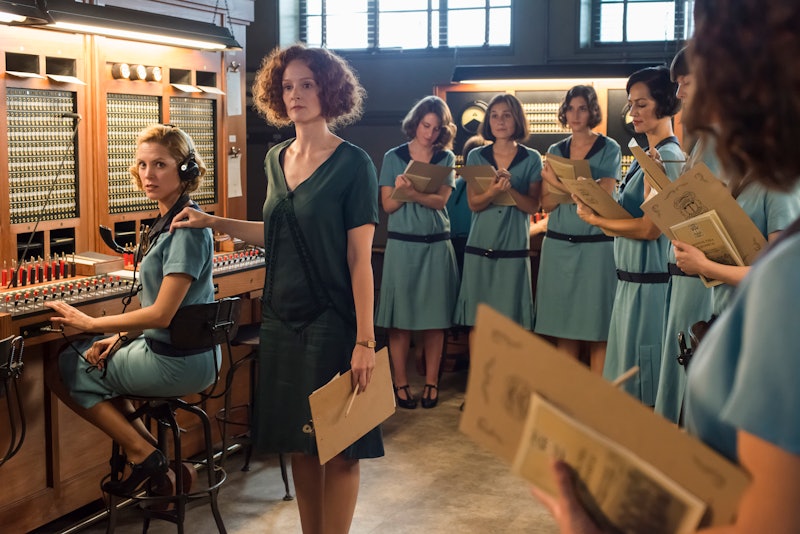Entertainment
'Las Chicas Del Cable' Is A Spanish Feminist History Lesson

Telephones have a gendered history. When they first became popular, the connection between phones and women was seen by some as a dangerous combination of gossip and housewife boredom. For its April 2017 lineup, Netflix’s Spanish drama Las Chicas Del Cable hopes to take this image and portray a feminist story of independence in Spain during the early twentieth century. The title translates in English to Cable Girls, and the eight episodes will follow the lives of four young women living in Madrid and working as switchboard operators at a telephone company. But is Las Chicas Del Cable based on a true story?
While the characters are fictionalized, the show's backdrop of Spain’s first telecommunications company, Telefónia, and its hiring of female phone operators is based in fact. However, the show begins in 1928, a year before building construction on the actual Telefónica was complete, according to the company's website, and a few years before Spain would grant women the right to vote in 1931. Despite being sandwiched between two major historical events, Nadia de Santiago, who plays Marga, explained to NME that the first Spanish language Netflix original is, "set in Spain, but it is very international. It’s in the 1920s but it could be the '20s in any other cities. And though it is set in the 1920s, we don’t really discuss politics of the decade. It’s not about what’s happening in Spain historically.”
While the show promises to be its own narrative, the inspiration behind Las Chicas Del Cable carries historical significance: All over the world, young female office workers in the 1920s were moving to progressive, modernized cities in hopes of landing a steady job as a telephone operator. In Smithsonian Magazine article "The History of the Flapper," Emily Spivack writes, “All these factors — freedoms experienced from working outside the home, a push for equal rights, greater mobility, technological innovation and disposable income — exposed people to new places, ideas and ways of living.”
Lorraine Ryan explores this financial independence in her article, "A Case Apart: The Evolution of Spanish Feminism" by pointing out that while the feminist movement originated in Spain in 1915, it began to gain momentum as soon as women became more evolved in the workforce. Ryan writes, "Claiming women's increased participation in the workforce and equal wages, it was also an unashamedly political movement." Through this movement, Ryan believes that "this pioneering feminism, although largely ineffectual, did succeed in raising the novel idea of rights for women and, as such, contributed towards a form of gender awareness."
Placing Las Chicas del Cable between the beginning of the feminist movement in Spain and women gaining the right to vote emphasizes to viewers that while the characters may be fictional, a woman's fight for a place in the tech workforce and a seat at the table is still a real-life issue.
Using Telefónica as a literal and figurative icon of communication, viewers will be able to watch the struggles of a changing world mixed with the struggles of what it means to be a woman in the 1920's. Fellow Cable Girl Maggie Civantos, who plays Ángeles, told Teleprograma that she feels the struggles women face and the show's technological revolution is still relevant today: "For them, working with what was leading technology at that time is a liberation; Not like now, that women are a bit enslaved by the image and the photos that are spread over the internet." (Note: this interview was translated from the original Spanish by the writer.)
At its heart, Las Chicas Del Cable wishes to emphasize the sisterhood among the characters, as the women lean on each other to navigate their relationships with each other and with the men they meet. With the show's desire to make the story more than a period piece, viewers may be able to connect el poder de la hermandad (the power of the sisterhood) in their real lives.